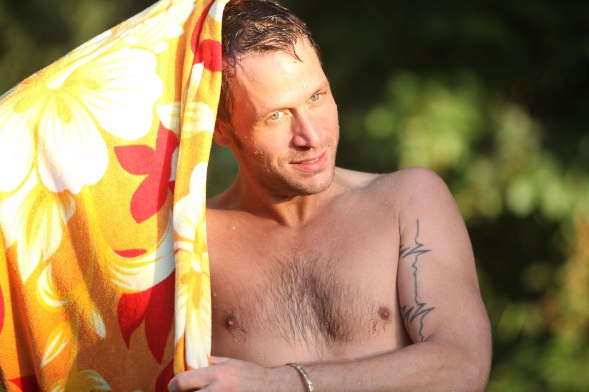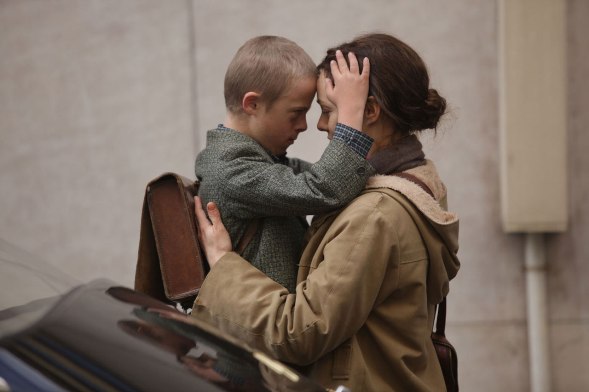I’m tempted to skip the tedious reviewing business of summarising plot, characterisation and technical strengths of Cafe de Flore, the new film by director Jean-Marc Vallee. It would be easier to simply trot out as many cliches about what love really means as come to mind, for one thing. Lord knows, the film spends much of its time mining these for all their worth. But this would do the film a bit of a disservice – just a bit – and in any case, I didn’t end up any wiser about the ineffable nature of true love as when I began. This might be my fault, of course. But bear with me.

2011, Canada. Antoine (Kevin Parent) is a DJ, not your run of the mill battered record bag and Technics headphones sort of feller, but a real player. He jets across the Atlantic to do gigs and stuff. He’s almost 40, and ought to be happy. Great job, great kids, beautiful house, loving girlfriend. Yes, there is the matter of Carole, his ex and mother of his daughters, whom he left for Rose (Evelyn Brochu). His parents still love her, and his kids haven’t quite warmed to his new paramour. He’d been with Carole since they were teenagers and bonded over a shared love of 80s music – The Smiths, The Cure, that sort of thing. (I’m puzzled about about how a semi-Goth from the 80s becomes a super-cool club DJ. But perhaps I’m sweating the small stuff.) “Do you believe in soulmates? I do. I like the concept that there is somebody who is supposed to be with you for ever.” Antoine muses. He and Carole had told each other for years that their love was written in the stars, etc etc. Until, apparently, it was not.

1969. Paris. Jacqueline (Vanessa Paradis) gives birth to a child with Downs’ Syndrome, and her partner does a runner when she refuses to put the child up for adoption. She’s determined not to give up on him though, despite the bleak prognosis – he won’t live past the age of 25, for instance. Tucked away in a grotty, book-lined Parisian garret, she does everything she can do to beat the odds. Laurent (Marin Gerrier – a really engaging presence, and not because of/despite his condition) is breast-fed until the age of four to boost his immune system, is fed a daily regime of vitamins to boost his immune system. She reads voraciously about his condition, indulges him incessantly. He’s now 7, and theirs is an intimate, almost inextricably intertwined pas des deux.
Almost inextricably. One day, Vero (Alice Dubois) turns up at Laurent’s school. Her parents are chic where Jacqueline is frugal, wealthy where she is impoverished. Vero is a Downs’ Syndrome child too: the two take a shine to one another on sight and become inseparable, literally so. It must be pretty rough when the centre of one’s world, the very reason for one’s existence, becomes smitten with someone else without warning. I’m not giving very much away when I say that Jacqueline takes it rather hard.
What brings the two stories together? There is the reasonable presumption that Vallee – who past work includes, most noteably, 2005’s C.R.A.Z.Y. – might have intended a thoughtful meditation on the real meaning of true love. What we have, 40 odd-years apart are two discomfiting menages a trois: Carole shut out from the world she had created with Antoine, Jacqueline from self sufficiency with Laurent. On this point, Vallee does strike the right notes most of the time. It’s always painful playing gooseberry. Carole sleepwalks, has violent disturbing dreams, is most certainly not in a good place even though she does yoga and tries to keep a brave face. Jacqueline, across time and the sea, is curt and tart with Laurent. When the school suggest that it is time for Laurent to move on to a more appropriate institution, she is quietly appalled; when Vero’s parents tell her that they have found the right place, and that they’d be happy to help with the costs given the attachment the two children have for one another, she lets rip with a passion. Hell hath no fury like a woman scorned etc etc. Especially when her son is doing the scorning, albeit unknowingly.
Whether this premise would have been enough to carry the film would be grounds for a good argument. Sadly, it’s one we won’t be having because the link between the two strands is…well, let’s just say that it’s more causative than coincidental. Vallee holds his cards close to his chest: it takes quite some time before we even have anything more than a sniff of what pulls the two stories together: Laurent, Jacqueline and Vero, Antoine, Carole and Rose.
The thing is this: It’s one thing to make a film founded on an other-worldly premise. But if one insists on stretching credulity, it must be done as incisively and as cleanly as possible. Cafe de Flore is neither of these things. The tempo is uneven, the storyline wilfully fractured, at times jumping from the 1960s to the 2010s without warning: a staccato beat not quite like one of Antoine’s favorite grooves. But elsewhere, Vallee lingers at length in a place, and just as one is lulled into a false sense of continuity and security…
But it’s not just that. Cafe de Flore is a sprawling untidy film, ambitious yet unsatisfying. At two hours, it is simply too long: by the time the pieces begin to fit together, one’s patience had already been sorely tested. One wants at least have a sense of where one is being led, but the route is just too digressive and unpredictable. The acting and mise en scene is much the same. The contemporary story hovers too close to the banal to really keep one engaged, Florent the only one who manages to make the best of limited material. Back in the 60s, histrionics are the order of the day with Vanessa Paradis’s Jacqueline over-egging her passion. That said, some of her moments with Laurent – there’s a bit where mother and child are playing in bed together, for example – are the most beautiful and touching things you’ll see on a screen all year, I promise you.
But this isn’t enough to hold things together. Music is supposed to be the key: narrative prods are draped casually across the film, but these are more inside jokes than helpful hints. An incongruous name on an album sleeve. The Cure’s Picture of You. Most infuriatingly, a fleeting reference by Antoine to Sigur Ros’s Svefn-g-englar, a name-drop (a sound-drop?) so obscure that I’m still not entirely sure the reference was deliberate or not. (Look up the song’s 1999 video-promo after watching the film. Don’t cheat.) It all reeks of the self-indulgence that undermines an admittedly intriguing premise. It might be that Vallee’s love for his material was written in the stars: but he might have done himself a favour if he had grounded it in a place accessible for the rest of us.
Cafe de Flore (2011, 120 min, French with Hebrew and English subtitles)
Written and directed by Jean-Marc Vallee; Starring: Vanessa Paradis, Kevin Parent, Helene Florent, Evelyn Brochu, Marin Gerrier, Alice Dubois





